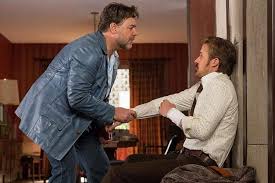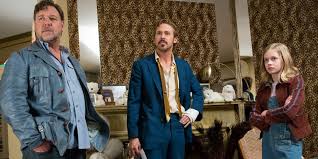
[caption id="attachment_51258" align="alignnone" width="1024"] Russell Crowe and Ryan Gosling in "The Nice Guys."[/caption]
Russell Crowe and Ryan Gosling in "The Nice Guys."[/caption]
By Danny Peary
[caption id="attachment_51255" align="alignleft" width="275"] Healy and March "meet cute."[/caption]
Healy and March "meet cute."[/caption]
The Nice Guys, which opened at the UA East Hampton 6 on Friday, is a buddy detective-comedy pairing Ryan Gosling as inept private eye Holland March and Russell Crowe as hired enforcer Jackson Healy, two men who don’t like each other but join forces to solve a murder (of porn star Misty Mountains) and a seemingly unrelated disappearance. As IMDB states: “During their investigation, they uncover a shocking criminal conspiracy which reaches up to the highest circles of power.” Written and directed by Shane Black (who scripted Lethal Weapon; and wrote and directed Kiss Kiss Bang Bang and Iron Man 3), The Nice Guys is set in 1977 Los Angeles, but because of financial reasons, was filmed in Atlanta. That’s where I did a set visit, on the 33rd day of a 49-day shoot, for the Australian magazine FilmInk back in 2014. Along with seven other international journalists, I spent many hours on a freezing night both inside and outside a large Atlanta hotel, speaking to cast and crew whenever they became available and watching the nattily-dressed Gosling and Crowe film action sequences involving a grenade exploding, their jumping over cars, and some hand-to-hand combat. In fact, Gosling and Crowe were so busy that we got to talk to them only briefly--at about 2 am. They both seemed exhausted as they plopped down on some wooden chairs and immediately polluted the room with thick cigarette smoke, while using one paper cup for their ashtray. I note my questions.
[caption id="attachment_51257" align="alignright" width="318"] The nice guys with March's daughter Holly (Angourie Rice).[/caption]
The nice guys with March's daughter Holly (Angourie Rice).[/caption]
Danny Peary: Are you guys through for the night?
Russell Crowe: No, we’re just taking a break. Ryan doesn’t actually smoke, he’s just in character.
DP: Did you know each other before you were cast?
RC: We had an assignation, once. A quiet dinner, just me and Ryan and twenty other people.
DP: Did you have a table reading before shooting began to get a rhythm for the two of you?
Ryan Gosling: Yeah, we did have a table reading.
RC: But we didn’t have what you’d call an ideal preparation for this, it was very fast.
DP: But did it work right away, in your opinion?
RC: Yeah, yeah. It just means that we talk constantly and we plan on the run.
Q: Are you improvising, then?
[embed]https://www.youtube.com/watch?v=z-_HQ0bUzS8[/embed]
RC: Yes.
Q: Prior to The Nice Guys, we’ve had mismatched-partners incarnations in past movies, whether in the detective genre or whatever, and the two men need to fuse together to get to the end result.
RC: People like to see that friendship blossom, in lots of different ways. It’s like in L.A. Confidential where the two characters come together at the end. They’re individuals but they come together and are locked in.
RG: This what Joel Silver [the film's producer] and Shane do best. If Lethal Weapon and 48 Hrs. had a kid and he lost his virginity while Kiss Kiss Bang Bang was on TV, then you might end up with Healy and March.
Q: They’re flawed characters--is that what makes it interesting?
RC (laughing): Well, we’re just characters, we’re definitely not flawed.
Q: But you’re character is a little bit of an alcoholic.
RC: Hey, he’s a man who works hard. He likes a drink at the end of the day. And first thing in the morning. You’d have thought that the guy is a debt collector who sits alone in a small apartment above a comedy club, hearing the laughter. That’s the soundtrack of his life. He doesn’t have much communication – he can’t hear the jokes, but he can hear the result.
Q: Chemistry can’t be created, it’s just inherent, and having watched you tonight, for the two for you, it’s just there.
RC: Chemistry is a funny thing. You never know if it’s going to be there or not. Ryan just makes me laugh, and that keeps me engaged in a certain sort of way. The characterization that he’s doing is so special.
DP: Did one of you say, “I’m going to be the straight man and you’re going to be the comic in this scene?”
RG: That dynamic was there in the script. With Shane Black, there is always a great mixture of humor and drama. It’s the kind of mix that only he can do in this particular way.
Q: Shane Black says Chinatown influenced the story. That had to do with corruption in L.A. regarding water rights; your film is about the auto industry in the late 1970s. Can you talk about that part of the movie through your characters’ eyes?
RC: It is, really, similar from my point of view. There was that aspect, social commentary aspect in the script, which elevated the material, in my mind. You look at the state of Detroit now, and you look at what happened in the 1970s that prevented Detroit from ending up being another, better place right now. It’s decayed through the specific decision to hold onto things rather than look to the future. That’s what was really interesting to me.
Q: Ryan, when you read the script for the first time, what were you attracted to?
RG: How Shane always finds a way to subvert things. What’s so great about this film is that it’s aware of what it is, but at the same time it’s still very much its own thing. There’s a great scene with Russell’s character is surprised in his apartment by these two goons and a gun goes off, and it hits the lady in the next apartment, you just hear her wailing the entire scene. We did a scene the other day where I toss a gun to Russell across the room and he’s supposed to start shooting. It was a very cool moment. When we were about to shoot that scene, Shane’s like, “Wouldn’t it be funny if you threw the gun but you threw it a little bit too high and it went out the window? Then you have to do the scene without a gun.”
Q: In the scene we saw being filmed tonight, you guys were running and shooting. It had to be a little boy’s fantasy to do a scene like that.
RC: As an old man, I’m sick of doing shit like that! They gotta pull me out of there on a wheelchair! “What? I got to run over there? Just great…”
RG: I’ve never really done an action film, so for me this is all new. I’m a babe in the woods. [Laughing] I’m learning so much from Russell.
Q: Is it advantageous to shoot with several cameras on actions scenes like that when there is choreography involved?
RC: Shane doesn’t really shoot with multiple cameras a lot. He’s actually most of the time shooting with just one camera, which I haven’t done for years and years.
RG: That’s all I’ve ever done. Working on smaller films, I’ve never done the multiple-camera thing. Some cases they’ll cross-shoot if they can, and hope it works--because you can improvise.
DP: Ryan, you have said, “I’ve always wanted to entertain.” I don’t know if you were kidding around when you said that.
RG: No, I was being serious.
DP: Yet since none of your past characters are the type that wants to act or entertain, you couldn't play them in a way that shows that part of you. Instead you played them with a lot of introspection. What about March? Is he more flamboyant and outgoing than your usual screen characters?
RG: Yes, he is. He isn’t introspective, but very different from that. This movie is much broader than anything I’ve ever done. The physical comedy sequences are really fun to do.
Q: You both are coming off your first directing experiences. Do you have more of a director’s eye now?
RC: I’m always very interested in what the camera is doing, I have information that I want to feed to this inanimate object so I want to know where it is. In a situation like this, though, when you go onto a movie, there’s a lieutenant – the director you’re working for--so it doesn't cross over. You’re working for somebody else’s vision and the way he wants it.
RG: I’ve become much more sensitive to what directors go through, so it’s been really helpful for me, actually. Still it’s nice to come to the set and have all the cameras already set up, and just do my part.
RC: Whereas you see me--I just love being in charge. I’m totally comfortable if every single creative decision is mine! I don’t think that surprises any of you.
DP: Do your characters evolve at all, changing from the beginning to end of the movie, or could they be moved to the next movie, the sequel, as exactly the same characters they are when we first meet them?
RC: Well, there’s movement in terms of how they start out as opposing forces, and then join together when working the case. There’s movement, and also I think, a sort of maturity aspect with Ryan’s character. They don’t change their thoughts but they certainly get something out of the experience.
DP: Ryan, March’s daughter is trying to change him, so he'll be more responsible--does it happen?
RG: She is trying to do that and she does it.
RC: There’s a moment where his daughter gets upset with him and calls him out. I think there’s definitely a building empathy.
RG: March is disenfranchised and disillusioned with how little change you can actually make in the world, so he’s really going for low-hanging fruit in the beginning of the movie--cheating scandals, things that aren't right with retirement homes, that sort of thing. But he meets Healy and becomes much more optimistic.
RC (laughing): Whereas the opposite happens with Healy. He starts with a certain wounded nobility and ends up an alcoholic!
SPOILER ALERT
Q: March and Healy don’t start out on a really nice note, but do they become friends?
RC: They’re still not buddies at the end of the story. They’ve connected, they’ve done something together, but they’re still not close.
END SPOILER ALERT